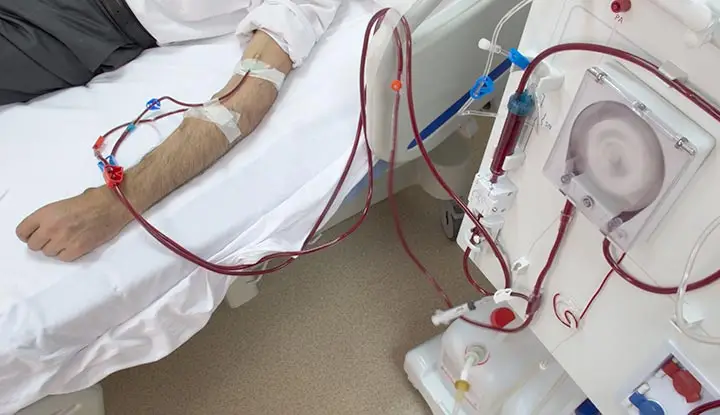Hemodialysis
What is Hemodialysis?
Hemodialysis is a medical procedure used to treat individuals with advanced kidney failure, also known as end-stage renal disease (ESRD) or stage 5 chronic kidney disease (CKD). This condition occurs when the kidneys are no longer able to effectively filter waste products and excess fluids from the blood.
What happens during Hemodialysis?
During hemodialysis, the patient’s blood is circulated through a dialysis machine that acts as an artificial kidney. The machine removes waste products, such as urea and creatinine, as well as excess fluids from the blood. This process helps to maintain the body’s overall fluid and electrolyte balance, which is essential for proper functioning.
The dialysis machine contains a special filter, called a dialyzer or artificial kidney, which consists of semipermeable membranes. These membranes allow waste products and excess fluids to pass through while retaining essential blood components, such as red blood cells and proteins.

Can you live a normal life with hemodialysis?
Living a normal life while undergoing hemodialysis is possible with adherence to treatment, lifestyle adjustments, and proper management. Regular attendance at hemodialysis sessions is essential for maintaining health, managing fluid levels, and removing waste products from the body. Following a kidney-friendly diet, adhering to fluid intake restrictions, and managing medications are important components of managing kidney failure and hemodialysis. Monitoring health parameters such as blood pressure, blood sugar levels, and weight, along with engaging in light to moderate physical activity, contributes to overall well-being. Seeking emotional support from healthcare providers, support groups, friends, and family members can help individuals cope with the emotional challenges associated with kidney failure and hemodialysis. Despite the challenges, many individuals are able to lead fulfilling lives by effectively managing their condition and making necessary lifestyle modifications, achieving a sense of normalcy and maintaining a good quality of life while undergoing hemodialysis.
What are the benefits of Hemodialysis?
Hemodialysis offers several benefits for individuals with end-stage renal disease (ESRD) or advanced kidney failure:
- Removal of Waste Products: Hemodialysis effectively removes waste products, such as urea and creatinine, from the bloodstream. These waste products accumulate in the body when the kidneys are unable to filter them out properly, leading to various complications if left untreated. By removing these waste products, hemodialysis helps maintain better overall health and reduces the risk of complications associated with kidney failure.
- Management of Fluid Levels: The process of hemodialysis helps to remove excess fluid from the body. In individuals with kidney failure, the kidneys are unable to regulate fluid balance effectively, leading to fluid retention and swelling (edema). Hemodialysis helps manage fluid levels by removing excess fluid, which can reduce symptoms such as swelling, shortness of breath, and high blood pressure.
- Correction of Electrolyte Imbalances: Kidneys play a crucial role in regulating electrolyte levels in the body, including sodium, potassium, and calcium. In kidney failure, electrolyte imbalances can occur, leading to complications such as muscle weakness, irregular heartbeat, and bone disorders. Hemodialysis helps correct these imbalances by removing excess electrolytes from the bloodstream and maintaining proper levels.
- Improvement in Symptoms: Hemodialysis can alleviate symptoms associated with kidney failure, such as fatigue, weakness, nausea, vomiting, and itching. By removing waste products and excess fluid from the body, hemodialysis helps patients feel better and improve their quality of life.
- Maintenance of Acid-Base Balance: Kidneys play a crucial role in maintaining the body’s acid-base balance. In kidney failure, acidosis (increased acidity in the blood) can occur, leading to various complications. Hemodialysis helps correct acid-base imbalances by removing acid from the bloodstream, thereby maintaining proper pH levels.
- Lifesaving Treatment: For individuals with severe kidney failure, hemodialysis is a lifesaving treatment that provides essential support for maintaining overall health and well-being. Without hemodialysis, the accumulation of waste products and fluid retention can lead to life-threatening complications.
Hemodialysis is a vital medical procedure for individuals with advanced kidney failure, offering numerous benefits that significantly improve their quality of life and overall health. By effectively removing waste products, managing fluid levels, correcting electrolyte imbalances, alleviating symptoms, and maintaining acid-base balance, hemodialysis plays a crucial role in supporting patients with end-stage renal disease or advanced chronic kidney disease. Furthermore, hemodialysis serves as a lifesaving treatment, providing essential support for individuals with severe kidney failure and preventing life-threatening complications associated with the accumulation of waste products and fluid retention. At Mobil Dialysis, we are committed to delivering exceptional hemodialysis services, ensuring optimal care and support for our patients’ renal health journey.
